VOTER GUIDE
 On Tuesday, June 30, Faith in Public Life and Interfaith Power & Light released a voter reflection guide endorsed by prominent national faith groups and religious leaders. The guide, Democracy, Values & the 2020 Election, addresses urgent issues in the election, including voting rights, climate change, systemic racism in the criminal justice system, healthcare and immigration. The guide, which will be distributed across the country for discussion in diverse faith communities, includes topics for reflection and sample questions to ask candidates Download Full Guide Here
On Tuesday, June 30, Faith in Public Life and Interfaith Power & Light released a voter reflection guide endorsed by prominent national faith groups and religious leaders. The guide, Democracy, Values & the 2020 Election, addresses urgent issues in the election, including voting rights, climate change, systemic racism in the criminal justice system, healthcare and immigration. The guide, which will be distributed across the country for discussion in diverse faith communities, includes topics for reflection and sample questions to ask candidates Download Full Guide Here
Download Spanish-language version of the guide, Democracia, Valores y las Elecciones de 2020
Issues and Questions
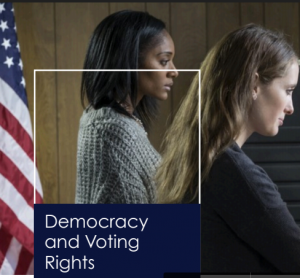 Democracy and Voting Rights (Page 1)
Democracy and Voting Rights (Page 1)
This election is more than a choice between parties and ideologies. An even more fundamental question is at stake: Can we preserve democracy in the face of serious threats to fair elections and fundamental rights?
Questions for Reflection and Candidates
- How do you see democratic values at risk today?
- How do systemic barriers to voting undermine our most sacred democratic values?
- How can your faith community better advocate for stronger voter protections at the state and local level?
- As a candidate, what are your specific plans for protecting and strengthening voting rights?
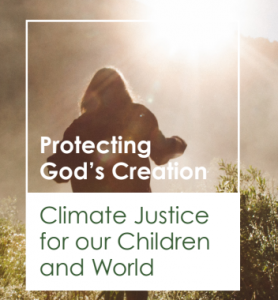 Protecting God’s Creation Climate Justice for our Children and World (Page 2)
Protecting God’s Creation Climate Justice for our Children and World (Page 2)
As people of faith, we believe that responding to the urgent threat of climate change is essential to caring for God’s creation and loving our neighbors. Human activity, primarily the burning of fossil fuels for energy, has thrown
nature out of balance, polluted the air, driven thousands of species of God’s creatures to extinction, intensified catastrophic events such as wildfires and hurricanes, and threatened the lives and livelihoods of our most vulnerable brothers, sisters and neighbors around the world. Scientists tell us we have less than a decade to avoid even more catastrophic consequences.
The United States has a unique responsibility to show moral and political leadership:
- Transitioning our economy away from polluting fossil fuels toward 100% clean energy.
- Honoring the emissions-reduction commitments our nation made at the UN Conference on Climate Change in Paris in 2015, and taking additional actions needed to avert catastrophic global warming.
- Assisting developing nations— who are least responsible for climate change but most impacted by it — in coping with threats such as increased droughts, disease, and sea-level rise by sharing technology and financial support.
Questions for Reflection and Candidates
- What does your faith teach about our responsibilities for the Earth and to others? How are they interdependent?
- Has your faith community made an effort to cut emissions, save energy, or practice environmental stewardship?
- As a candidate, what specific policies do you support to protect God’s Creation and secure a safe climate for our children and future generations?
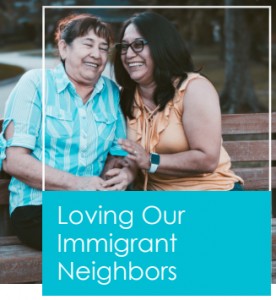 Loving Our Immigrant Neighbors (Page 4)
Loving Our Immigrant Neighbors (Page 4)
Scripture repeatedly makes clear that immigrants must be treated with dignity. Policies that rip children from their parents’ arms, lock people away in inhumane conditions, and ban desperate families from entering the country
should keep us awake at night. As people of faith, we believe that the way we treat our immigrant neighbors is a sign of how we treat God.
Questions for Reflection and Candidates
- How can we replace immoral immigration policies that tear families apart and cause trauma with an immigration system that values families and affirms the dignity of allv people?
- What can we do to heal the wounds inflicted on immigrant communities by political rhetoric that portrays them as a dangerous “other?”
- If there are immigrants in our community who are feeling isolated and under threat, how can we show support and build connections?
- As a candidate, what will you do to defend the dignity of all immigrants, and how will you further policies that keep families together?
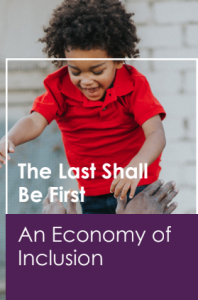 The Last Shall Be First An Economy of Inclusion (Page 5)
The Last Shall Be First An Economy of Inclusion (Page 5)
Our economic systems should work for all Americans, not only the wealthiest few. This is a matter of justice and
human dignity. All religious traditions recognize that charity is essential to care for the most vulnerable, but helping our neighbors in poverty also compels us to address its root causes. “Charity is no substitute for justice withheld,” St. Augustine observed centuries ago.
Questions for Reflection and Candidates
- What can we do to ensure that all Americans are able to provide for their families and live with security and dignity?
- How do we create a just tax system that is fair to all Americans, including working families who are trapped in poverty?
- Why does the United States lag behind most developed countries when it comes to providing paid sick leave and paid family leave?
- As a candidate, what are your specific plans to ensure workers have living wages and economic security while the coronavirus pandemic continues, as well as for the long term?
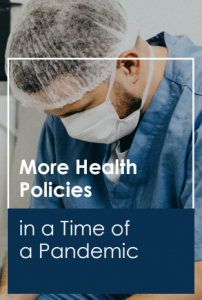 More Health Policies in a Time of a Pandemic (Page 7)
More Health Policies in a Time of a Pandemic (Page 7)
Despite our nation’s stated values of life and equality, the United States is the only industrialized country in the world that does not guarantee its residents universal access to health care. This is a failure of political and moral imagination – especially in a time of pandemic.
Questions for Reflection and Candidates
- How can people of faith be most effective in using our stories, congregations and power to advocate for health care reform?
- What do you struggle with the most when it comes to our healthcare system?
- How has the COVID-19 crisis impacted your community? What policy solutions can keep us all safe and remedy racial and economic inequalities in your community?
- As a candidate, what are your specific plans for making sure that quality,
affordable health care is available for all?
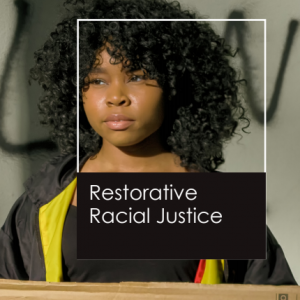 Restorative Racial Justice (Page 9)
Restorative Racial Justice (Page 9)
Justice and redemption are at the very heart of faith. Restorative justice begins with listening to and empowering communities that have been exploited, excluded and denied equal representation and freedom. The evil ideology of
white supremacy shaped our nation from its founding and continues to impact policies and communities today, especially in the criminal justice system. The killings of Ahmaud Arbery, Breonna Taylor, George Floyd and so many other Black people, Indigenous people, and other people of color, has provoked a growing, multi-racial moral movement for accountability and systemic reforms for racial justice.
Questions for Reflection and Candidates
- How can we dismantle the evil ideology of white supremacy in our culture and political systems?
- What can be done to end racial profiling and police violence against people of color?
- What steps can be taken to ensure formerly incarcerated people have voting rights and fair access to employment?
- As a candidate, what will you do to ensure racial justice is prioritized in the criminal justice system?
- How do we build safe communities for everyone, particularly people of color?
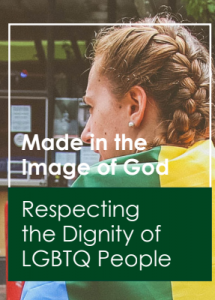 Made in the Image of God: Respecting the Dignity of LGBTQ People (Page 11)
Made in the Image of God: Respecting the Dignity of LGBTQ People (Page 11)
All people have inherent dignity because everyone is created in the image of God. Our gay, lesbian, bisexual and transgender family members, neighbors and co-workers deserve equal rights, and to live without fear or discrimination.
Questions for Reflection and Candidates
- How can your faith community more fully support the equal dignity of LGBTQ people in your state and local area?
- What are the greatest threats to LGBTQ people in your community and the nation?
- As a candidate, what are your specific plans to ensure that LGBTQ people have equal rights and are treated with dignity
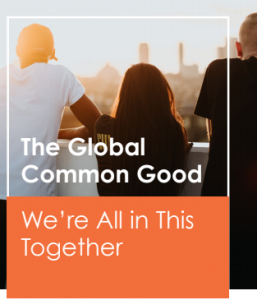 The Global Common Good: We’re All in This Together (Page 12)
The Global Common Good: We’re All in This Together (Page 12)
What does it mean to love our neighbors as ourselves in a globalized world? The health and future of our country and
communities are interconnected to the health and security of other nations. Our fates are bound up in what Rev. Martin Luther King, Jr., called “an inescapable network of mutuality.”
Questions for Reflection and Candidates
- What policies do you think are most important for creating security for your family and community?
- What role should the United States play in the world to help build global peace and security?
- How can your faith community advocate for policies to create a more peaceful world?
- As a candidate, what programs and policies would you prioritize to help build secure communities and a peaceful world?

Climate Crisis, Human Journey: A Faithful Response to Migration
/in Faithful Citizenship, Featured Articles, Reflections /by adminAs people who care deeply about the climate crisis and our sacred creation, we cannot ignore the connections between human migration and what is happening to the earth. Our country is the largest historical contributor to climate-changing emissions globally. As such, we are profoundly shaping the instability of ecologies and economies that displace people all over the world – only to then reject and vilify those who are displaced and seeking livable and workable conditions in our midst.
Rev. Dr. Lorraine Cineceros speaks poignantly of our country’s present crisis of migration in a public prayer, excerpted below:
With new and ancient eyes, we see that the collision of the current adminstration’s immigration policies with the already present realities of climate change are creating conditions for an unprecedented humanitarian crisis of global migration – especially for our siblings in the global south.
As people of faith and conscience, we are called to continually connect the dots between climate and migration. We are called to resist the normalization of taking too much from each other and from the earth. We are called witness to the truth of unbordered skies, unbordered rivers, and unbordered hearts.
We are called to ground ourselves in what is real: migration has always been a holy expression of creaturely existence. Migration is the shape of the monarch butterfly, generation upon generation journeying back and forth from the Rocky Mountain West to the alpine forests of Mexico and everything in between. Migration is the song of the sandhill crane dancing in our fields each winter, departing in the rush of spring – each way, they are following the direction home. Migration is the creative, restless, adaptive impulse of the human family – ever pushed and pulled into new horizons, longing to exchange stories, art, music, food, culture, life, and love amidst the dignity of our differences.
As we lament and resist the conditions that force people from their homelands, may we also recognize and celebrate the gifts of beauty, creativity, insight, connection, healing and community that are meant to flow freely across our so called borders and between our holy and ever-merging lives.
As a part of our moral calling to protect Mother Earth, may we seek to create the conditions in which people are welcomed to the places we call home with the depths of dignity and love expressed at the core of all our spiritual and faith traditions.
Rev. Clara Sims
Assistant Executive Director, NM and El Paso Interfaith Power and Light
“They Thought They Could Bury Us…” The Church and the Climate Crisis
/in Faithful Citizenship, Featured Articles, Reflections /by adminThese words were on the front cover of a small publication someone had left behind at the coffee shop where I was engaged in conversation. The words became sweeter than the latte I was sipping. They are about resilience, yes, but even more—they speak the language of resurrection.
“It’s the story of Jesus—buried and rising. It’s the call of the Church—resilient and rising.” And if ever there was a time to be called out—to be the ekklesia—it’s now.
The Greek word ekklesia doesn’t mean a building or a denomination. It means a people called out from wherever they are into public assembly—to talk about a crisis in the community, or even the cosmos. That’s what the early church did. That’s what we are supposed to do.
And what could be more of a cosmic crisis than climate change?
Now I know—I can hear the objection: “The church shouldn’t get political.” But honestly, when has the church not been involved in the crises of its time, at least when it’s been at its best? Abolition. Civil rights. Peace movements. The call to care for the poor. These weren’t distractions from the gospel. They were the gospel, lived out loud.
So here we are again. The planet is groaning, quite literally. Wildfires, floods, rising seas, vanishing species—not warnings of some distant apocalypse, but signs of one already unfolding. This is not a drill. And yet, this is not a moment without hope.
I want to be clear: the church is still here. Even if people don’t hear about us much anymore. Even if our voice has been drowned out by louder ones that claim Jesus for their own political agenda. Even if some days we wonder if our voice matters at all.
It does. It must.
This is not just a scientific issue, though science is crucial. This is a moral issue. A justice issue. A spiritual issue. The people harmed first and worst by climate disruption are the poor, the young, the marginalized, the voiceless—just the ones Jesus always seemed to be drawn to. And we must not forget the non-human species with whom we share the planet.
If we believe in love of neighbor,
we cannot ignore this.
If we believe the earth is God’s creation,
we cannot treat it like a landfill.
If we believe resurrection is real,
then we must believe that even now, new life can rise from the ash.
The church still gathers every week. We still sing, and pray, and listen. What if we listened to the cries of the earth? What if our prayers included the forests, the coral reefs, the farmers in drought, the children yet unborn? What if we looked at our budgets, our buildings, our energy use—and asked, “What would love do here?”
It’s time to reclaim our voice—not in fear or anger, but in courage and faith.
Let us be the seeds.
Let us be the saints.
Let us be the ekklesia the world needs right now. We’ve been buried long enough.
Let’s rise.
– Rev. Harry Eberts
We Are Earth: A Faithful Response to the Climate Crisis
/in Faithful Citizenship, Featured Articles, Reflections /by adminAs leaders in Washington D.C. push harmful climate policies, they endanger us all—including themselves. In our recent newsletter, our Executive Director, Desirée Bernard, calls us to walk together toward justice, healing, and hope. Read her full statement below.
Dear NM & El Paso IPL Community,
Across our beautiful planet and region we are witnessing the impacts of the climate crisis. Each day we struggle to metabolize information about new disasters, threats, and diminishments to our sacred creation. We see extractivist worldviews driving leaders in Washington D.C. to push policies that don’t just harm the planet – they endanger everyone, including the people advancing them. So many of the truths we are called to witness in this moment are weighing upon and breaking our hearts.
And still we the people–we are Earth! If we had forgotten, we are increasingly waking up to this reality. When we harm that which sustains us, we harm ourselves. And when we rise to protect that, we are protecting ourselves and our loved ones. Arising to protect. This, too, is who we are.
We the people cannot be stopped in our widespread and still-emerging movements to care for ourselves, one another, and our common home.
We invite you to join our efforts at New Mexico and El Paso Interfaith Power and Light. We are already mobilizing and planning to further mobilize projects that put our faith in action to protect our climate, lands, waters, and people.
Are you or your faith community ready to reduce your greenhouse gas emissions, collaborate on land and water based projects, or advocate for helpful policies? We are here to support you in your desire to do something!
Together we are choosing and will keep walking a path of justice, healing, and hope.
Together, rooted in courage and love, we can and will shape a future where all beings may thrive.
In faith and solidarity,
Desirée Bernard
Executive Director, NM and El Paso Interfaith Power and Light